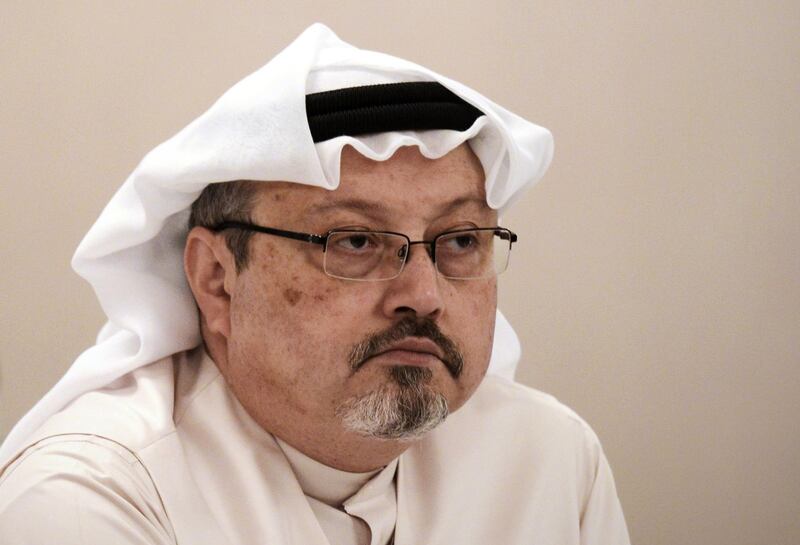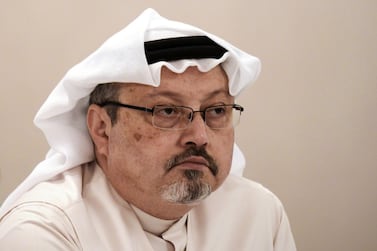The son of murdered journalist Jamal Khashoggi on Monday welcomed the speedy resolution to the trial as a court in Riyadh sentenced five men to death for the killing in the Saudi consulate last September.
"Today we have been granted justice as the children of the deceased, Jamal Khashoggi,” tweeted Salah Khashoggi. "We affirm our confidence in the Saudi judiciary at all levels, that it has been fair to us and that justice has been achieved.
“The legitimacy of the judiciary is based on two factors – fairness and the speed of the litigation process to ensure that injustice and delaying tactics were avoided.”
إنصاف القضاء يقوم على مبدأين، العدالة وسرعة التقاضي، فلا ظلم ولا مماطلة. اليوم القضاء أنصفنا نحن ابناء المرحوم، بإذن الله جمال خاشقجي. ونؤكد ثقتنا في القضاء السعودي بكافة مستوياته وقيامه بإنصافنا وتحقيق العدالة. الحمد لله والشكر له.
— salah khashoggi (@salahkhashoggi) December 23, 2019
Salah’s brother, Abdullah Khashoggi, retweeted the comments.
UAE Minister of State for Foreign Affairs Dr Anwar Gargash said on Monday that the kingdom's handling of the trial confirmed "the independence, integrity and efficiency" of the Saudi judiciary.
The United States welcomed the sentences issued by Saudi Arabia against the five people over the murder of the journalist.
"Today's verdicts were an important step in holding those responsible for this terrible crime accountable," a State Department official told reporters after the ruling on Monday.
The remarks came hours after the Riyadh court sentenced five men to death for the murder, three to 24 years in prison for covering up the crime and “violating the law”, a statement from the kingdom’s public prosecutor read.
Read more: Timeline: the murder of Jamal Khashoggi
Fifteen months ago, Khashoggi was murdered at Riyadh’s consulate in Istanbul in a case that gripped the world.
While at first Khashoggi appeared to be missing, it later transpired he never left the diplomatic outpost. Saudi officials vowed to launch a full investigation into his killing and filed charges against 11 men.
Officials said the killing was a “rogue operation” but the court said on Monday that there was no plan to kill the former unofficial spokesman of the government turned critic.
On Monday, Saudi Arabia’s Deputy Public Prosecutor Shalaan bin Rajih Shalaan said the court dropped charges against two prominent Saudi officials – former deputy intelligence chief Ahmed Al Assiri and former advisor to the crown prince Saud Al Qahtani – and the pair were released.
They were both sacked from their posts after the incident.
#STATEMENT by the Public Prosecutor regarding the murder of citizen Jamal bin Ahmed bin Hamza Khashoggi (may his soul Rest In Peace). pic.twitter.com/745x7OABkx
— Foreign Ministry 🇸🇦 (@KSAmofaEN) December 23, 2019
Last November, the Saudi prosecutor said Mr Al Qahtani discussed Khashoggi's activities before he entered the Saudi consulate.
The prosecutor said Mr Al Qahtani acted in coordination with Mr Al Asiri, who he said had ordered Khashoggi's repatriation from Turkey and that the lead negotiator on the ground then decided to kill him.
Mr Al Shalaan said on Monday that Mr Asiri was released due to insufficient evidence, while Mr Qahtani was not charged and was also released.
“Investigations into three individuals showed there was no prior intention to kill Mr Khashoggi,” the state prosecutor said.
Mr Shalaan clarified that “the decision was taken at the spur of the moment".
He also said statements by Turkish witnesses indicated that former Saudi consulate general Mohammed Al Otaibi was not in the building at the time.
Mr Al Shalaan said the former diplomat had no knowledge of the killing and was released without charge.
On Monday, the deputy prosecutor said the Saudi team that entered the consulate decided it would not be possible to transfer Khashoggi to a safe place to continue negotiating and chose to kill him.
"It was agreed, in consultation between the head of the negotiating team and the culprits, to kill Jamal Khashoggi inside the consulate," the deputy prosecutor said.
Saudi officials have repeatedly said the killing took place without the knowledge of the country’s leaders, although Crown Prince Mohammed Bin Salman said he bore responsibility as “it happened under my watch".
The killing spurred a reform of the kingdom’s intelligence agencies and the creation of three new oversight bodies to ensure all operations are conducted in line with the national security policy, international human rights law and "approved procedures".
The trial opened in January this year. By October, Saudi courts heard eight sessions related to the killing, with several sessions attended by representatives of members of the UN Security Council and Turkish and Saudi Arabian human rights organisations. Representatives of Khashoggi’s family also attended.
A senior US official told The National the trial and the verdict on Monday was "an important step in holding those responsible for this terrible crime accountable".
"We encourage Saudi Arabia to continue with a fair and transparent judicial process," the official said.
On Monday, British Foreign Secretary Dominic Raab reacted to the verdict and said Khashoggi's family deserved justice.
"Saudi Arabia must ensure all of those responsible are held to account and that such an atrocity can never happen again," Mr Raab said.
The UK's foreign office said it condemned the use of the death penalty in all circumstances.
The Saudi public prosecutor said the sentences were subject to appeal. “The public prosecution will study the verdict and look into objections to it in front of the appeals court,” a statement said.
According to Saudi criminal law, sentences can either be appealed by those convicted or the prosecutor. The Appellate Court, which consists of five judges, is authorised to review sentences of death, stoning, amputation and other punishments.
Even if affirmed by the Appellate Court, sentences may not be final unless they are approved by the Permanent Panel of the Supreme Judicial Council. According to the law, if the Supreme Judicial Council does not affirm the sentence, it “shall be reversed and the case shall be remanded for reconsideration by other judges".







